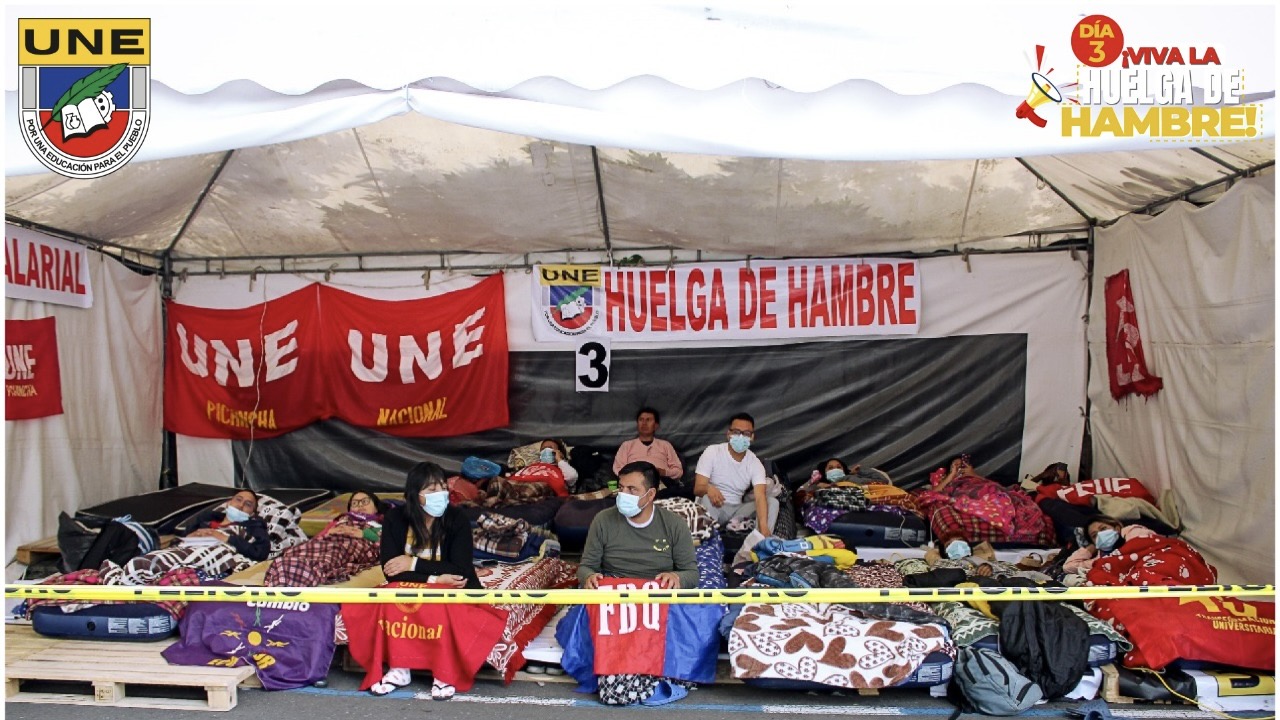On May 3, dozens of Ecuadorian teachers associated with the National Union of Educators (UNE) began an indefinite hunger strike in defense of the Organic Law of Intercultural Education (LOEI) and in rejection of conservative president Guillermo Lasso’s decision to veto it for unconstitutionality. In the capital Quito, a group of fourteen teachers set up a camp outside the Constitutional Court (CC) and began the strike. Meanwhile, another group of seventeen teachers camped out at Plaza San Francisco in Guayaquil city and joined the protest.
The teachers are demanding that the Constitutional Court act in accordance with the law, independently, without being influenced by the Lasso government, and validate the constitutionality of the LOEI. They are demanding the implementation of all articles of the LOEI, including equalization of teachers’ salaries at national level. In Ecuador, the teachers teaching in public institutions receive around 50% less salaries than those teaching in private institutions.
UNE’s president, Isabel Vargas, told local media from Quito that “here we are and here we will stay until the Constitutional Court resolves, equates, and repairs the rights of the teachers.” “We strongly reject the presidential veto, as it contains allegations that were dismissed by the Constitutional Court last year,” she added.
On May 3, various students and parents blocked the Santo Domingo-Quito road in solidarity with the teachers on hunger strike, who were repressed by the police officers and prevented from installing the camp. The hunger strike has received the support of the Unitary Front of Workers (FUT), the Federation of University Students of Ecuador (FEUE), the Federation of Secondary Students of Ecuador (FESE), Women for Change, among other social organizations and unions.
🔴#ATENCIÓN | Este jueves se cumple el tercer día de huelga de hambre de la Unión Nacional de Educadores (@UNENACIONAL), instalada frente a la @CorteConstEcu, en #Quito. Dos huelguistas ya reciben atención médica. pic.twitter.com/u4yJ8x9z3j
— Radio Pichincha (@radio_pichincha) May 5, 2022
The LOEI is an educational reform that modifies about 80% of the existing education system, which has been in force since March 2011. It is the product of 12 years of extensive work of more than 100 educational organizations and unions. It increases the budget for the education sector from 4% to to 6% of the country’s GDP, guarantees inclusive and quality public education, includes artistic and cultural teaching, employs special education teachers for students with disabilities at all educational levels, provides free Internet in all public education establishments, increases the basic salary of teachers, establishes the reinstatement of teachers who were fired or dismissed during the health emergency due to the COVID-19 pandemic, establishes special retirement policies, among other measures.
The law was approved unanimously in the National Assembly, Ecuador’s unicameral parliament, in March 2021, and by former president Lenin Moreno in April 2021. It would have come into effect in July 2021, however, it remained suspended due to a lawsuit filed against it by the Ecuadorian Social Security Institute (IESS). In July 2021, the UNE organized a similar hunger strike, which continued for 32 days, to demand that the Constitutional Court uphold the LOEI. At that time, the country’s highest court ratified the validity of the LOEI and declared that the reforms related to a special retirement system and an increase in teachers’ salaries would enter into force only after their “formal defect of unconstitutionality” or sources of finance is resolved in the parliament. The court granted the parliament a period of six months to resolve the issues.
On March 13, the current National Assembly approved the increase in remuneration for teachers grade-wise and determined some sources of finance, such as tax collection and surplus from sale of crude oil, but it did not give way to the special retirement regime. However, on April 14, President Lasso vetoed the reform completely for its unconstitutionality. He rejected it arguing that there was a lack of sources to fund and cover the expense generated by salary increases. He pointed out that the economy and finance ministry had disapproved of the financial feasibility of the salary increases as it generated pressure on the treasury and increased fiscal deficit. He said that the assembly members continued with the processing of the regulations without considering the finance ministry’s position, which was unconstitutional. On April 22, the National Assembly requested the CC to pronounce on the matter.
On May 4, the Constitutional Court issued an order to call a public hearing on May 12 to discuss the new reforms to the LOEI. The court ordered the National Assembly and the Presidency of the Republic to submit their arguments regarding the LOEI and summoned them to a public hearing. The UNE celebrated the call for a public hearing on the matter and announced that the hunger strike would continue. The UNE previously filed the amicus curiae appeal and its representatives are expected to be received at the hearing.
✊3 día de #HuelgaDeHambre en los exteriores de la @CorteConstEcu por la defensa de la equiparación salarial en medio del apoyo y solidaridad de estudiantes y docentes universitarios de la @utcCotopaxi
¡Gracias por su apoyo!#UNEteALuchar pic.twitter.com/weDvdI9REq
— UNE NACIONAL (@UNENACIONAL) May 5, 2022





